Announcements
Penn Vet’s Division of External Retinal Therapies is often in the news. Check back often to read the latest articles on our research.

2025
Genetic cause of day blindness in Standard poodles and Doodles found!
For years,an inherited form of congenital day blindness/retinal degeneration has been reported in standard poodles and related mixed breeds (e.g. Labradoodle, Goldendoodle, Bernedoodle, Cockapoo, …). Vision scientists and geneticists from the Division of ExpeRTs have now identified its genetic cause: a mutation in a gene called SPATA7 that also causes early and severe blindness in people. This paves the way to the future development of genetic tests and gene therapy.

2025
DogAEye: The first AI-based tool to help diagnose retinal degeneration in dogs
A team of veterinary ophthalmologists and computer scientist from the Division of ExpeRTs have developed a program that uses artificial intelligence to help diagnose retinal disease in dogs affected with progressive retinal atrophy (PRA).
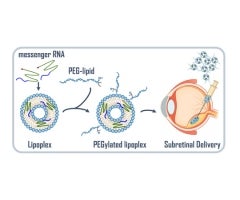
2025
A new approach to deliver mRNAs to the retina
The efficient delivery of synthetic mRNA to the retina has been a barrier to mRNA-based treatments for vision loss. Vision scientists from the Division of ExpeRTs have found that coating mRNA-lipid complexes (lipoplexes) with polyethylene glycol (PEG)-lipid derivatives can enhance their stability and penetration into retinal tissue.
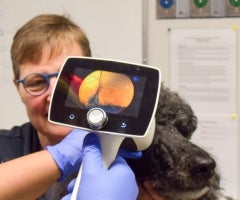
2025
PennVet’s Ophthalmology service opens the very first retinal clinic for animals
Inherited diseases that affect the retina are a common cause of blindness in dogs and cats. Over the past two decades veterinary ophthalmologists and vision scientists from the Division of Experts have identified and studied many forms of inherited retinal degeneration in dogs. The new retinal clinic that is part of PennVet’s ophthalmology service at the Ryan Veterinary Hospital was established this year to provide owners with visually impaired animals, precise diagnosis, genetic counseling and information of potential future therapies.
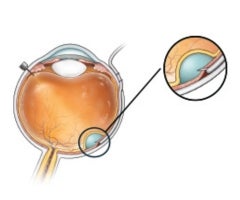
2025
Approaching the retina from the back of the eye
A team of vision scientists from the Division of ExpeRTs have worked to demonstrate that a novel surgical tool used previously in gene and cell therapy clinical trials can place therapies directly beneath the canine retina using a minimally invasive approach.
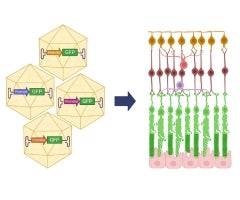
2025
Optimizing gene therapy tools for advanced stages of retinal degeneration
A collaborative team of researchers led by vision scientists from the Division of ExpeRTs have developed novel promoters that drive strong and specific gene expression in rod and cone photoreceptors in mid-to-late stages of disease, potentially offering new and improved options for gene therapy.
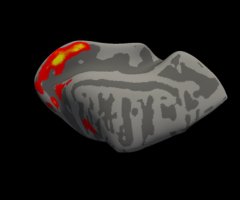
2024
Using fMRI, new vision study finds promising model for restoring cone function
With the goal of developing novel gene and cell therapies that can restore daylight vision in people and in dogs, vision scientists from Penn Vet’s Division of ExpeRTs have developed a new fMRI protocol to measure non-invasively brain activity in the visual cortex that is triggered by cone photoreceptors. Using this approach they have demonstrated that a gene therapy for a form of day blindness restores cortical function.
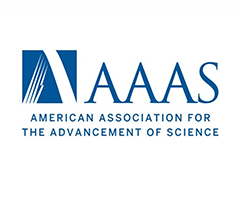
2023
William Beltran elected 2022 fellow of the American Association for the Advancement of Science (AAAS).
The American Association for the Advancement of Science (AAAS) is an American international non-profit organization with the stated goals of promoting cooperation among scientists, defending scientific freedom, encouraging scientific responsibility, and supporting scientific education and science outreach for the betterment of all humanity.
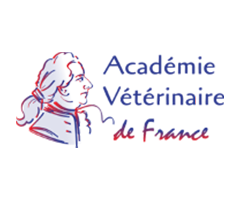
2023
Gustavo Aguirre and William Beltran elected to the French Academy of Veterinary Medicine
Aguirre and Beltran were elected as lifetime members of the Académie Vétérinaire de France (AVF). The AVF provides guidance on scientific, technical, legal, historical and ethical fields in which the skills of the veterinarian are exercised, in particular those relating to animals, their diseases, their relations with humans and the environment, animal production, and veterinary public health. It contributes to the dissemination of scientific progress and the improvement of techniques relating to veterinary activities.
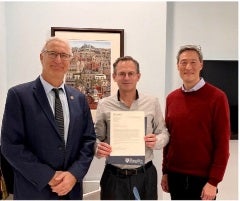
2022
William Beltran Named Corinne R. and Henry Bower Professor of Ophthalmology at the University of Pennsylvania’s School of Veterinary Medicine
Andrew M. Hoffman, DVM, DVSc, DACVIM, Gilbert S. Kahn Dean of the School of Veterinary Medicine at the University of Pennsylvania (Penn Vet) has named William Beltran, DVM, MSc, PhD, DECVO, an internationally recognized veterinary ophthalmologist, the Corinne R. and Henry Bower Professor of Ophthalmology.
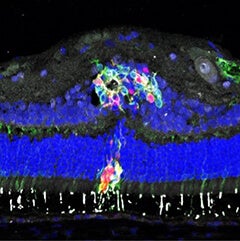
2022
Replacing dead photoreceptors
As a potential new therapeutic approach aimed at restoring vision in blind people and animals that have lost all of their rods and cones due to retinal degeneration, vision scientists from Penn Vet’s Division of ExpeRTs, together with collaborators at the University of Wisconsin-Madison, the Children Hospital of Philadelphia, and the National Eye Institute, have shown long-term survival and integration of stem-cell derived photoreceptor precursor cells surgically implanted into canine eyes. These results pave the way to evaluating in dogs the functional benefit of this regenerative medicine strategy.
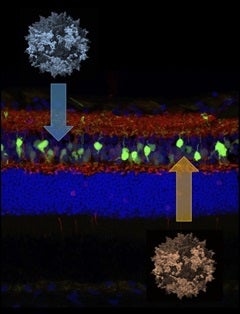
2022
Seeing again in the dark
Both people and dogs with congenital stationary night blindness (CSNB) have trouble perceiving objects in dim light. Vision scientists from Penn Vet’s Division of ExpeRTs, together with collaborators at the University of Pittsburgh, and University of California-Berkeley, have developed a novel gene therapy that restores night vision in dogs affected with this inherited condition. The results underscore the potential that a similar therapy might effectively treat CSNB in humans.

2021
Second round of funding from Fighting Blindness Canada to study new cell therapy for retinitis pigmentosa
Vision scientists from Penn Vet’s Division of ExpeRTs, together with collaborators at the University of Wisconsin-Madison have been awarded CAD$725,000 from Fighting Blindness Canada’s Restore Vision 20/20 program to continue their ground-breaking research into cell replacement therapy for retinitis pigmentosa, an inherited retinal disease. The goal of this project is to test if a new stem cell therapy can improve vision in canine models of retinitis pigmentosa.
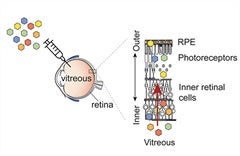
2021
Novel gene therapy platform speeds search for ways to cure blindness
Vision scientists from Penn Vet’s Division of ExpeRTs, together with collaborators at the University of Pittsburgh, University of California-Berkeley, and Carnegie Mellon University have developed and used a new screening approach to identify novel viral vectors that can efficiently target numerous cell populations in the retina after a simple intraocular injection. This provides hope that some of these top-performing viral vectors can be used to deliver therapeutic genes to the retina and treat several blinding conditions in people and in dogs.
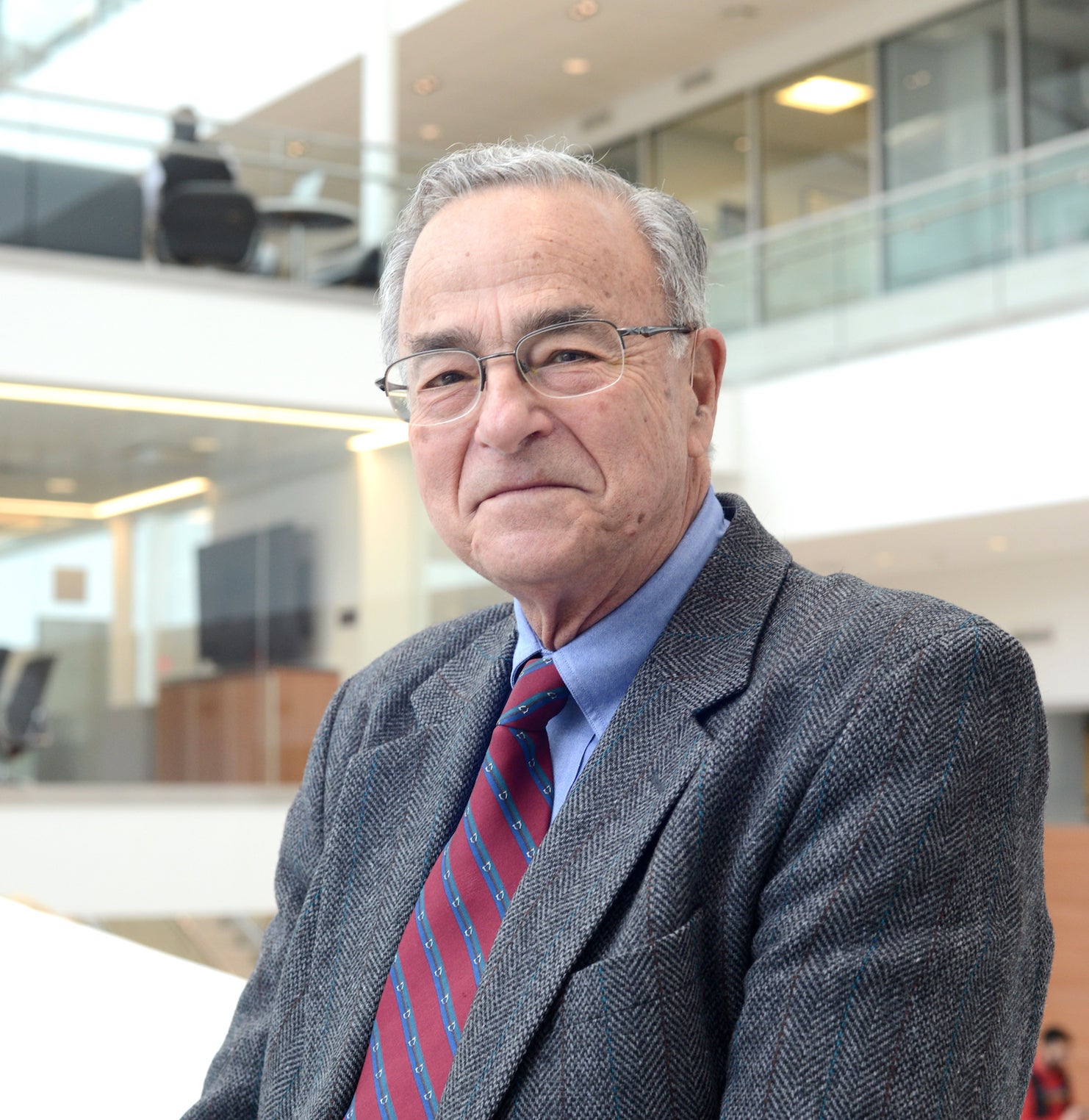
2020
Gustavo Aguirre wins the Greenberg End Blindness 2020 Outstanding Achievement Prize
Dr. Gustavo Aguirre, Professor of Ophthalmology and Medical Genetics, and Division of ExpeRTs investigator, was a co-recipient of the Sanford and Sue Greenberg Prize to End Blindness in recognition for his decades-long research with canine models of inherited retinal diseases that has led to several clinical trials for emerging therapies, including LUXTURNA
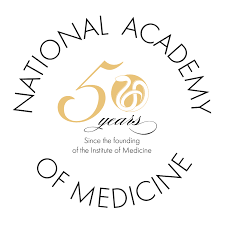
2020
William Beltran elected member of the National Academy of Medicine
Dr. William Beltran, Professor of Ophthalmology and Director of the Division of ExpeRTS, was elected as a new member of the National Academy of Medicine. Founded 50 years ago, as the Institute of Medicine (IOM), the National Academy of Medicine (NAM) is one of the three academies that make up the National Academy of Sciences, Engineering, and Medicine (the National Academies) in the United States. The NAM’s mission is to improve health for all by advancing science, accelerating health equity, and providing independent, authoritative, and trusted advice on matters of science, technology, and health nationally and globally.
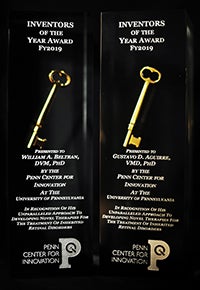
2019
Drs. Gustavo Aguirre and William Beltran win the Inventors of the Year Award
Dr. Gustavo Aguirre, Professor of Ophthalmology and Medical Genetics, and Dr. William Beltran, Professor of Ophthalmology, were co-recipients of the Penn 2019 Inventors of the Year Award. This award recognizes their numerous contributions to the development of novel retinal gene therapies for inherited retinal degenerations.
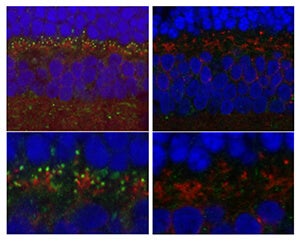
2019
Mutation in LRIT3 underlies a canine model of stationary night blindness
Investigators from the Division of ExpeRTs have identified a mutation in the LRIT3 gene responsible for congenital stationary night blindness (CSNB) in a new canine model. Identification of the molecular cause for canine CSNB that affects ON-bipolar cell function opens up possibilities to develop new approaches of gene therapy to target cell populations that are in the mid retina.
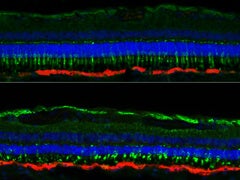
2019
Timing of Gene Therapy is critical to success
An FDA-approved gene therapy for Leber congenital amaurosis, an inherited vision disorder with a childhood onset and progressive nature, has improved patients’ sight. But new research conducted by investigators from the Division of ExpeRTs on this blinding condition underscores the importance of defining the time-window for long-term therapeutic benefit.
Leading the Fight Against Macular Degeneration
A long-term collaboration between Division of ExpeRTs investigators from PennVet and Scheie Eye Institute to develop a gene therapy for a form of inherited macular degeneration caused by mutations in the BEST-1 gene was featured in Scheie Vision, the institute’s annual report.
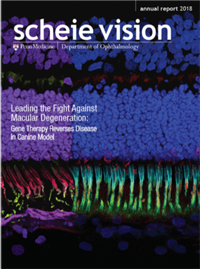
Multidisciplinary team to develop stem cell-based approaches to restore vision
Investigators from the Division of ExpeRTs are collaborating with Dr. David Gamm’s group (University of Wisconsin) to develop a stem-cell-based strategy to replace photoreceptors and treat blindness in dogs.
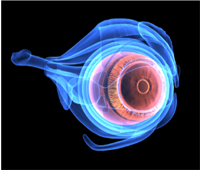
Dr. Gustavo Aguirre recognized as AAAS fellow
Division of ExpeRTs investigator, Dr. Gustavo Aguirre (PennVet Professor of Ophthalmology and Medical Genetics) was recognized as AAAS fellow for his distinguished contributions to the field of inherited blindness.
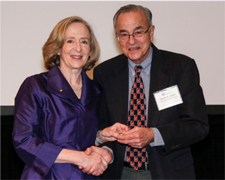
Knocking down Blindness: a novel gene therapy for autosomal dominant retinitis pigmentosa (adRP)
Investigators from the Divisions of ExpeRTs together with collaborators from the University of Florida have developed a gene therapy capable of both knocking down and replacing rhodopsin, the most commonly mutated gene in patients affected with adRP. This approach was protective in dogs affected with a similar condition.
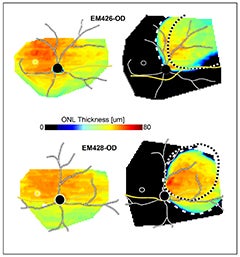
Dr. Gustavo Aguirre awarded the 2017 Proctor Medal
Division of ExpeRTs investigator, Dr. Gustavo Aguirre (PennVet Professor of Ophthalmology and Medical Genetics) received the 2017 Proctor medal award in recognition for his long-term contribution to the field of retinal diseases and therapies.
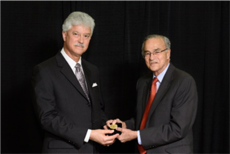
Inflammation during retinal degeneration
A study conducted by Division of ExpeRTs investigators shows that signaling pathways associated with the innate immune system are activated during late stage disease in dogs with inherited retinal degenerations, and thus identifies potential molecular targets for development of novel therapies.
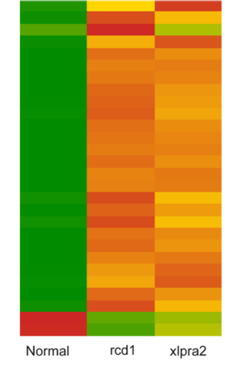
Identification of the underlying cause of a form of macular degeneration
Division of ExpeRTs investigators from the School of Veterinary Medicine and Dental School identify BEST disease is caused by that loss of microvilli on the surface of RPE cells result in a loose connection with photoreceptors.
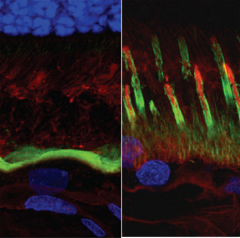
Before retinal cells die, they regenerate
Division of ExpeRTs investigators have found that in at least three canine retinal diseases, photoreceptor cells proliferate before blindness takes hold.
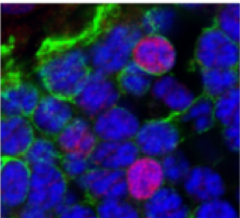
Dr. William Beltran awarded the ARVO Foundation’s 2016 Pfizer Ophthalmics Carl Camras Translational Research Award
Director of the Division of ExpeRTs, Dr. William Beltran (PennVet Professor of Ophthalmology) received this award in recognition for his contribution at better understanding X-linked retinitis pigmentosa and developing a gene therapy for this early and severe form of inherited blindness.

Dr. Gustavo Aguirre awarded the 2016 Louis Braille Award
Division of ExpeRTs investigator, Dr. Gustavo Aguirre (PennVet Professor of Ophthalmology and Medical Genetics) was awarded the 2016 Louis Braille Award by the Associated Services for the Blind and Visually Impaired in recognitions for his innovative research and treatment of inherited blinding diseases.
Gene therapy for X-linked retinitis pigmentosa (XLRP) halts vision loss in late stage disease
Investigators from the Division of ExpeRTs and Scheie Eye Institute that previously showed rescue of photoreceptors in dogs affected with a form of XLRP have now successfully demonstrated that this gene therapy is stable for more than 2 years and effective even when treatment is delivered after substantial loss of photoreceptors has occurred.
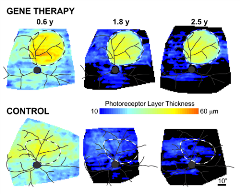
Cone Trouble
Investigators from the Division of ExpeRTs identify two naturally-occurring mutations in dogs that cause day blindness by disrupting molecular channels involved in vision.
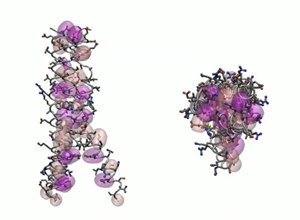
Anatomical Discovery by Penn Team Gives Insight into Blinding Retinal Diseases
University of Pennsylvania vision scientists report that dogs, too, have an area of their retina that strongly resembles the human fovea. What’s more, this retinal region is susceptible to genetic blinding diseases in dogs just as it is in humans.
Drs. Gustavo Aguirre and William Beltran awarded the Foundation Fighting Blindness Board of Directors Award
Division of ExpeRTs investigators, Drs. Aguirre and Beltran were presented the FFB’s Board of Directors award at the VISION 2013 national conference in recognition for their research that is advancing treatments and cures for retinal degenerative diseases.
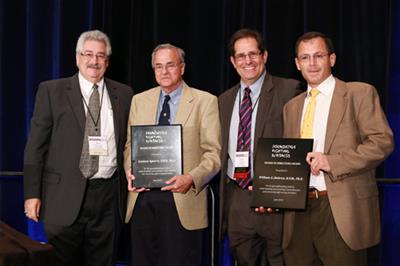
Penn Researchers take a first step toward a macular dystrophy gene therapy
Investigators from the Division of ExpeRTs, identify an optimal viral vector serotype for future gene therapy studies aimed restoring at a normal copy of the gene (BEST1) that is mutated in an inherited form of macular dystrophy called Best disease.
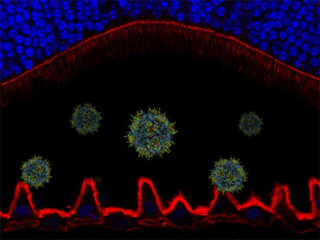
Dr. Gustavo Aguirre winner of the 2013 International Canine Health Award
Dr. Gustavo Aguirre, Professor of Ophthalmology & Medical Genetics received the International Canine Health Award from the Kennel Club Charitable Trust for his contribution to the advancement of research into canine eye diseases. The Kennel Club Charitable Trust is the UK’s largest organization dedicated to protecting and promoting the health and welfare of all dogs. International Canine Health Awards are underwritten by a major gift from Vernon and Shirley Hill.

First gene therapy for a common form of X-linked retinitis pigmentosa shows promise in dogs
A consortium of investigators from PennVet’s Division of ExpeRTs, the Scheie Eye Institute, and the University of Florida have developed a gene therapy for the most common cause of X-linked retinitis pigmentosa (XLRP) caused by mutations in the RPGR gene. This novel therapy prevents disease onset and halts ongoing photoreceptor death in dogs carrying two distinct mutations in this same gene.
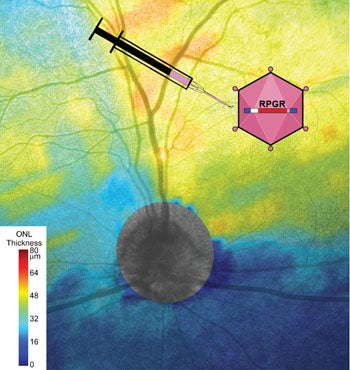
Dr. Gustavo Aguirre elected member of the Institute of Medicine
Dr. Gustavo Aguirre, Professor of Ophthalmology & Medical Genetics was elected as a new member of the Institute of Medicine. Established in 1970 by the National Academy of Sciences, IOM has become recognized as a national resource for independent, scientifically informed analysis and recommendations on health issues. With their election, members make a commitment to volunteer their service on IOM committees, boards, and other activities.

